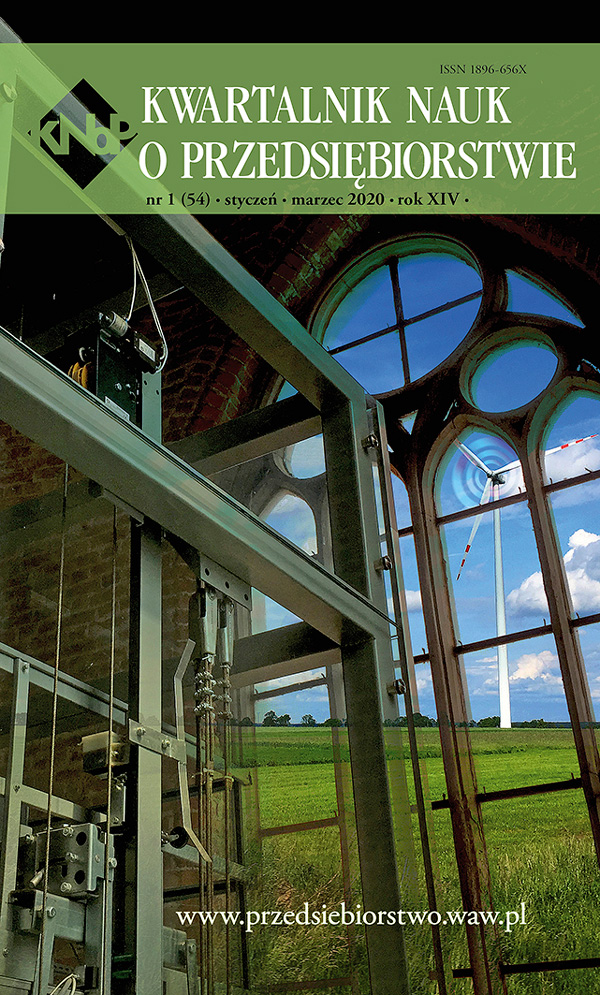Spółka celowa w procesie komercjalizacji wyników badań naukowych prowadzonych na uczelniach
Abstrakt
W gospodarce opartej na wiedzy obserwujemy bardzo silne przenikanie się gospodarki oraz nauki, a do miana podstawowego czynnika wytwórczego urasta technologia. Transfer wiedzy oraz związanej z nią technologii nie przebiega jednokierunkowo. Coraz częściej ośrodki akademickie przekonują się, że budowanie relacji ze światem biznesu jest dla nich koniecznością. W artykule podjęto się próby scharakteryzowania spółki celowej z położeniem szczególnego nacisku na jej rolę w procesie komercjalizacji wyników badań naukowych. Jej ostatnim etapem jest tworzenie przedsiębiorstwa typu spin-off, szczególnie w obszarze nowych technologii. Zaprezentowane zostały etapy powstawania tych przedsięwzięć, a także możliwe modele ich funkcjonowania. W artykule położono również nacisk na charakterystykę ich relacji z uniwersytetami lub instytucjami badawczymi. Ostatnia część rozważań zostały poświęcone instrumentom prezentującym strategie wejścia na rynek z nowymi przedsięwzięciami.
Full Text
Bibliografia
2. Brush C., Greene P., Hart M. (2001), From Initial Idea to Unique Advantage: The Entrepreneurial Challenge of Constructing a Resource Base, “Academy of Management Executive”, No. 15 (1).
3. Gans J., Scott E. L., Stern S. (2018), Strategia dla start-upów, “Harvard Business Review”, czerwiec.
4. Greco M., Grimaldi M., Scarabotti L., Schiraldi M. M. (2013), The Sources of Competitive Advantage in University Spin-Offs : a Case-Study, “Journal of Technology Management and Innovation”, Vol. 8, Issue 3.
5. Izdebski H., Zieliński J. M. (2019), Prawo o szkolnictwie wyższym i nauce. Komentarz, Wolters Kluwer.
6. „Mała” ustawa o innowacyjności – nowe prawo i korzyści dla biotechnologii, https://biotechnologia.pl/biotechnologia/mala-ustawa-o-innowacyjnosci-nowe-prawo-i-korzysci-dla-biotechnologii,17032 (dostęp: 11.02.2020).
7. Marszałek A. (2019), Główni aktorzy uczestniczący w transferze technologii towarzyszącym komercjalizacji wiedzy, „Marketing i Rynek”, nr 3.
8. Narodowe Centrum Badań i Rozwoju, Spin-off czy spin-out ?, https://www.ncbr.gov.pl/potrzebujewiedzy-firma/aktualnosci/szczegoly/news/spin-off-czy-spin-out-51233/ (dostęp: 11.02.2020).
9. Narodowe Centrum Badań i Rozwoju (2016), Komercjalizacja B+R dla praktyków 2016. Prawo, podatki, księgowość, Warszawa.
10. Ndonzuan F.N., Pirnay F., Surlemont B. (2002), A Stage Model of Academic Spin-Off Creation, “Technovation”, No. 22.
11. Orłowski J., Salamonowicz M., Instrumenty wsparcia działalności badawczo-rozwojowej oraz komercjalizacji jej wyników w tzw. „Małej ustawie o innowacyjności”.
12. Pattnaik P.N., Pandey S.C. (2014), University Spinoffs: What, Why and How?, “Technology Innovation Management Review”, December.
13. Podobieństwa i różnice w funkcjonowaniu spółki z o.o. i spółki akcyjnej, http://www.kodeksspolek.pl/artykul,1577,17198,podobienstwa-i-roznice-w-funkcjonowaniu-spolki-z-oo-i-spolki.html (dostęp: 13.02.2020).
14. Shah N., Sabet B., Lum J. (2018), Stwórz coś i zacznij sprzedawać, “Harvard Business Review”, 2018.
15. Narodowe Centrum Badań i Rozwoju, Spin-off czy spin-out ?, https://www.ncbr.gov.pl/potrzebujewiedzy-firma/aktualnosci/szczegoly/news/spin-off-czy-spin-out-51233/ (dostęp: 11.02.2020).
16. UNISPIN (2000), Good Practice Guide, University of Twente, Enschede 1999, w: Support of University Spin-off Companies, P. van der Sijde, J. van Tilburg, “Entrepreneurship and Innovation”, February.
17. Ustawa z dnia 20 lipca 2018 r., Prawo o szkolnictwie wyższym i nauce, Dz. U. 2018, poz. 1668.
18. Vantrappen H., Polastro E. (2015), How to Know if a Spin-Off Will Succeed?, “Harvard Business Review”, 24th February 2015, https://hbr.org/2015/02/how-to-know-if-a-spin-off-will-succeed (dostęp: 12.02.2020).
19. Vohora A., Wright M., Lockett A. (2004), Critical Junctures in the Development of University High- Tech Spinout Companies, “Research Policy”, No. 33.
20. Zachara S.A., van de Velde E., Larrañeta B. (2007), Knowledge Conversion Capability and the Performance of Corporate and University Spin-Offs, “Industrial and Corporate Change”, Vol. 16.
Autor
Autor (Autorzy) artykułu oświadcza, że przesłane opracowanie nie narusza praw autorskich osób trzecich. Wyraża zgodę na poddanie artykułu procedurze recenzji oraz dokonanie zmian redakcyjnych. Przenosi nieodpłatnie na Oficynę Wydawniczą SGH autorskie prawa majątkowe do utworu na polach eksploatacji wymienionych w art. 50 Ustawy z dnia 4 lutego 1994 r. o prawie autorskim i prawach pokrewnych – pod warunkiem, że praca została zaakceptowana do publikacji i opublikowana.
Oficyna Wydawnicza SGH posiada autorskie prawa majątkowe do wszystkich treści czasopisma. Zamieszczenie tekstu artykuły w repozytorium, na stronie domowej autora lub na innej stronie jest dozwolone o ile nie wiąże się z pozyskiwaniem korzyści majątkowych, a tekst wyposażony będzie w informacje źródłowe (w tym również tytuł, rok, numer i adres internetowy czasopisma).
Osoby zainteresowane komercyjnym wykorzystaniem zawartości czasopisma proszone są o kontakt z Redakcją.

